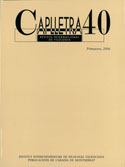L'escriptor, de llengua en llengua. Joan Fuster i les traduccions
DOI:
https://doi.org/10.7203/caplletra.40.4847Palabras clave:
Translation, Joan Fuster writer and translator, «engagé» intellectual Resumen
Resumen
This work approaches the study of the relationship between the figure of the translator and that of the writer in the framework of translating activities related to the Catalan language. In the person of Joan Fuster both sides are combined: he is an author translated into other languages, such as Spanish, English or Italian and he is, at the same time, a translator himself of European literary works, especially of Ignazio Silone and particularly Albert Camus. Both figures appear in the 20th century literature as an example of the intellectual who struggled among intellectual freedom and social and political commitment.
The argument focuses on the active role Fuster had regarding the reception of European literature in the Catalan cultural area through the translations and selections he makes of a subject matter, central in his thinking of the fifties and sixties: the intellectual’s commitment. His text on Erasmus of Rotterdam is emblematic in this sense. The final question is about the current validity of Fuster’s reflections regarding translation into other languages.
 Descargas
Descargas
Descargas
Publicado
Cómo citar
-
Resumen287
-
PDF (Català)247
Número
Sección
Licencia
El autor o autora que dirija un trabajo a la redacción de Caplletra para ser publicado tiene que ser la persona titular legítima de los derechos de explotación. La legitimación para la publicación del trabajo tiene que incluir también las imágenes, las tablas, los gráficos y otros materiales que puedan complementar el texto, con independencia de si es su autor o autora.
Copyright. Al publicar el trabajo en la revista, el autor o autora cede a Caplletra. Revista Internacional de Filologia los derechos de explotación (reproducción, distribución y comunicación pública), tanto para la edición impresa en papel como para la versión electrónica.
Todos los trabajos publicados en Caplletra se encuentran bajo una licencia Creative Commons del tipo Reconocimiento-NoComercial-SinObraDerivada 4.0.
RESPONSABILIDAD
Caplletra. Revista Internacional de Filologia no se identifica necesariamente con los puntos de vista sostenidos en los trabajos que publica.Caplletra. Revista Internacional de Filologia declina toda responsabilidad derivada de cualquier vulneración eventual de los derechos de propiedad intelectual que pudiera ser llevada a cabo por los autores o autoras.






